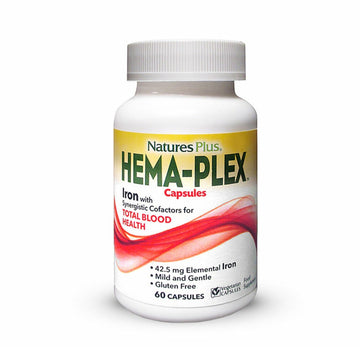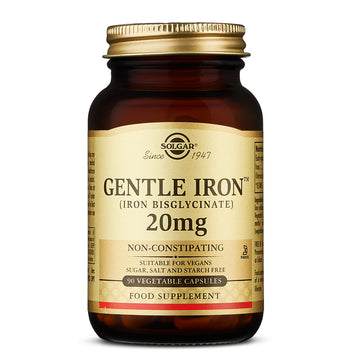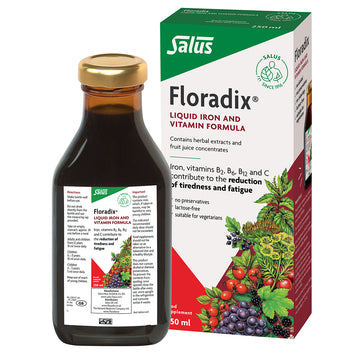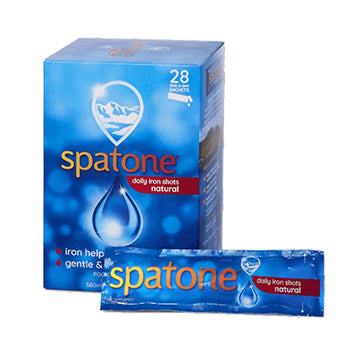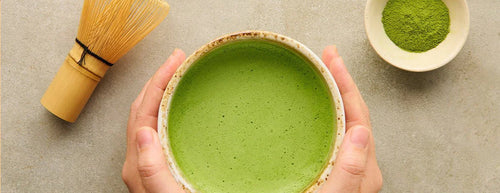How Iron Keeps Us Healthy
The fourth most abundant metal on earth, it’s no wonder iron affects our health in a variety of ways. An essential mineral required by every cell, iron is a vital building block to hundreds of proteins and enzymes in the body. Plus, it’s required for a variety of reactions that range from everything from oxygenating cells to energy production, gene regulation, cell repair, and DNA synthesis.
Here are the benefits of getting enough daily iron.
1. Iron Builds Healthy Red Blood Cells and Helps to Oxygenate the Body
The function of our red blood cells (erythrocytes) is to carry oxygen from our lungs to the rest of our other tissues and cells. But they can only do that with the help of iron. Red blood cells contain a special iron-containing protein called hemoglobin. Oxygen binds directly to the iron molecules in hemoglobin, allowing it to be transported throughout the body where it’s used to convert food to energy inside cells.
About 70% of the body’s total iron is stored within our red blood cells. But when iron stores run low, so does our count of healthy oxygen shuffling red blood cells. This can lead to iron deficiency anemia.
2. Iron Gives Us Energy
Iron allows oxygen to be transported to all the cells in our body. Our cells then use oxygen to create energy from the food we eat through the process of cellular respiration. If you don’t get enough iron because of a poor diet, absorption issues, or blood loss, it’s common to feel tired and weak.
3. Iron supports healthy muscles
Muscles need iron to stay healthy and where it’s stored is a protein called myoglobin. Similar to hemoglobin, myoglobin is another iron-containing protein found only in muscles that work to keep them oxygenated. This supports the healthy production of energy in muscles so they can contract and you can take a walk down the beach or pump your own iron in the gym. Without adequate iron in your system, muscles can become weak, while losing their tone and elasticity.
4. Iron Promotes Healthy Immune Function
Research has shown that both too little and too much iron can be associated with weakened immunity. Our immune cells including T-Cells and macrophages (engulf microorganisms and remove dead cells) require sufficient amounts of iron in order to eliminate infections, activate other immune system cells, and remove toxins from the body.
5. Iron Supports a Healthy Thyroid
Your thyroid, a butterfly-shaped gland that sits at the base of your neck, is important for regulating a variety of metabolic functions in the body including body temperature, breathing, weight maintenance, energy, muscle strength, and heart rate.
Low iron can trigger hypothyroidism, a disease where the thyroid can’t produce enough hormones to keep the body’s metabolic processes balanced. Symptoms of hypothyroidism include fatigue, dry skin, sensitivity to cold, muscle cramps and weakness, weight gain, and more.
6. Iron Supports Healthy Skin, Hair, and Nails
Iron is required by the body to produce collagen, a fibrous structural protein found in all the body’s connective tissues, including our hair, tendons, cartilage, and bone. Collagen is also an important component of skin, which gives it its elasticity and prevents it from sagging and wrinkling.
7. Iron Supports Building Healthy Bones
The cells within our bones are continually replacing old bone with new in a process called remodeling, which keeps them strong and healthy. And iron plays an important role in this process. First, we need iron in order to make a type of collagen which lays the foundation for the structure of bones (Type 1 Collagen).
Iron is also required by certain enzymes to transform Vitamin D3 into its active form, which is not only important for building healthy bones but healthy immunity as well.
How Much Iron Do You Need Each Day?
How much iron you get each day depends on a few factors, including age and gender.
These are general recommendations:
- Men: Should get 8mg/day (11mg/day if you're over age 50).
- Women who menstruate: Due to blood loss from menstruation women during childbearing years the RDA for dietary iron doubles to 18mg/day.
- Post-Menopausal Women: 8mg/day.
- Pregnant Women: Should get 27mgs/day to support their own body’s needs and those of their developing baby
- Vegetarian/Vegan Adults: Should consume 18mg/day of elemental dietary iron if they don't eat meat or poultry.
How to Get Enough Iron in Your Diet
The best way to ensure that you're getting enough iron is to eat a diet that includes plenty of iron-rich foods. When you eat and then digest foods with iron it comes in two forms: heme and non-heme iron.
- Heme iron: Is highly bioavailable and easy to absorb. Heme iron is obtained only from eating animal-based foods like meat, poultry, and fish.
- Non-heme iron: Non-heme iron is found in plant-based foods including fruits, vegetables, grains, nuts and seeds, but is also supplied by animal-based foods as well. Absorption of non-heme iron is typically less bioavailable than heme iron.
Here are some tips for getting more iron in your diet:
- Eat iron-rich meats, such as beef, beef liver and poultry.
- Eat seafood rich in seafood such as oysters, clams, and mussels.
- Good plant-based options include beans, lentils, tofu, nuts, and dried fruit and seeds.
- Eat plenty of dark leafy greens, such as kale or turnip greens
- Fortified foods such as cereals and bread are another way to get iron in your diet.
- Consider iron supplements. While you should always try to source iron from diet first, if this is not possible we suggest adding an iron supplement to your diet. If you have diagnosed iron deficiency anemia or have a medical condition that makes it difficult to absorb enough iron from food, your doctor may recommend iron supplements. However, we recommend consulting with a healthcare professional before starting any supplementation.
See our range of iron supplements by clicking here.
You can also test your iron levels using this quick and easy MyBio Iron Deficiency at-home test.




